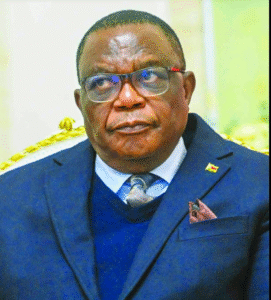UEBERT ANGEL’S AU APPOINTMENT EXPOSES DEEP CREDIBILITY CRISIS IN AFRICAN UNION LEADERSHIP
In an unexpected and highly controversial development, the African Union (AU) has appointed Uebert Angel as the Pan African Parliament Ambassador for Interfaith Dialogue and Humanitarian Affairs. The decision has ignited widespread criticism, coming just months after Angel was implicated in serious corruption allegations in Al Jazeera’s explosive Gold Mafia documentary. The appointment has cast a dark cloud over the AU’s credibility and raised urgent questions about transparency, ethics, and the future of African leadership.
Uebert Angel, a self-styled prophet and high-profile entrepreneur with a massive following across the continent, was prominently featured in Gold Mafia—a documentary that exposed vast networks of illicit gold trading, money laundering, and state-enabled corruption in Zimbabwe. In the film, Angel is seen engaging in deals and conversations that raised serious legal and ethical concerns, including claims of abusing diplomatic privileges for personal gain.
Against this backdrop, his elevation to a high-ranking ambassadorial role within the Pan African Parliament is deeply troubling. How can a man at the centre of such grave allegations be chosen to represent humanitarian ethics and interfaith cooperation? This move, critics argue, is not just a mistake—it’s a betrayal of African citizens who expect integrity from continental institutions.
For an institution tasked with promoting unity, peace, and sustainable development, the AU’s decision raises serious red flags. It suggests either a lack of rigorous vetting procedures or a troubling willingness to turn a blind eye to controversy for political convenience. Whichever it is, the optics are damaging. Citizens across Africa are left wondering whether the AU truly champions good governance and ethical leadership or merely preserves elite networks at any cost.
Defenders of Angel’s appointment argue that allegations are not convictions. They insist that until proven guilty in a court of law, he remains eligible for public service. But this misses the point. The AU, as a continental body that sets standards for leadership and governance, must operate above reproach. Perception matters in politics—and in this case, the perception is one of moral compromise.
Even more concerning is the AU’s lack of transparency. While the organization claims to have conducted its own internal review before finalising the appointment, it has offered no clear details about the process, findings, or rationale. This lack of accountability only fuels public mistrust and lends weight to the belief that political loyalty and backdoor dealings still trump integrity and merit in African politics.
The implications are profound. If someone with unresolved allegations of grand corruption can rise to such a prestigious role, what message does this send to the millions of honest, hardworking Africans hoping for a new era of leadership? It signals that impunity remains the rule rather than the exception. That no matter the severity of the accusations, political connections still guarantee access to power.
To salvage its dwindling reputation, the AU must act swiftly and decisively. First, it must explain the basis of Angel’s appointment and publish its findings—if any—on the corruption allegations he faces. Second, it must introduce a stringent, continent-wide vetting framework for all key appointments. This should include public input, civil society review, and, crucially, full transparency.
Continental unity and development cannot be built on a foundation of mistrust. Africa’s challenges—conflict, poverty, inequality, religious tension—require credible, ethical leadership. The AU cannot claim to speak for the people of Africa while it elevates individuals whose names are tied to the looting of African wealth and the abuse of diplomatic privilege.
The Uebert Angel appointment must become a turning point. It must awaken both the AU and the African public to the urgent need for reform, integrity, and public accountability at the highest levels of continental governance. If not, then the AU risks becoming yet another symbol of everything Africans are fighting to leave behind: corruption, impunity, and elite betrayal.



